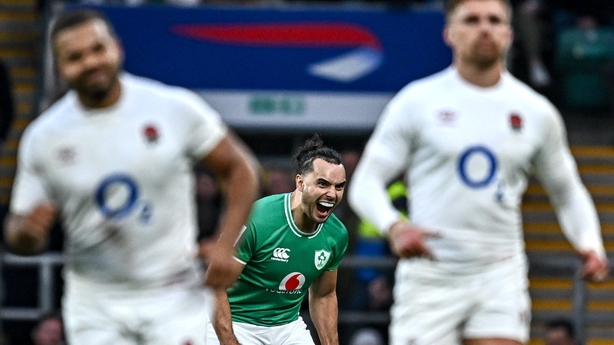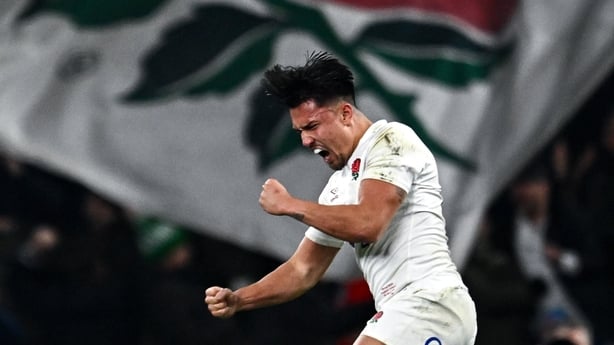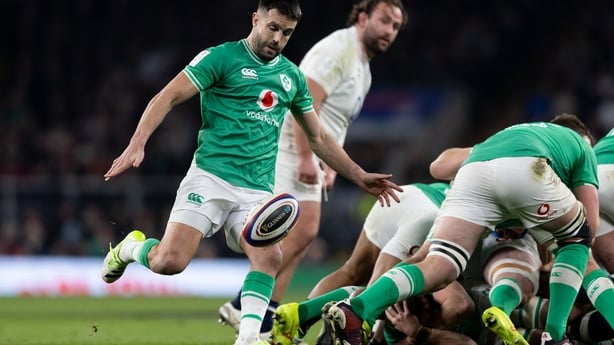Ireland may have been outplayed for large parts of their heartbreaking Six Nations defeat at Twickenham, but they will still rue opportunities to control the game at vital moments.
The hosts undoubtedly produced their best performance of the Steve Borthwick reign to derail Ireland's attempt at back-to-back Grand Slams, while also enhancing the buy-in within their group.
It should also serve to getting their supporters back onside.
Despite England’s psychological desperation to prove themselves to the increasing number of doubters, the visitors somehow managed to take a lead to the dressing room at half-time.
England threw everything they had at them and yet it was Ireland with their noses in front.
James Lowe’s try shortly after the resumption seemed to lift the pressure, but England’s physical dominance led to Ireland’s lack of control once more.
Irish exits weren’t as comfortable as they’d like and while kick exits always invite pressure, Borthwick’s side clearly had their homework done in making life difficult, leading to a quick response through George Furbank.
Not everything went Ireland’s way - losing two outside backs was always going to hinder their cohesion - but England had disrupted them in their own right regardless.
The men in green managed to keep throwing punches, but it felt like a boxer that was counter-punching from the ropes before landing a punishing blow themselves through a second Lowe try.

It was backs to the walls stuff after that at times and once more England managed to get at Ireland while the latter were in possession.
Ollie Chessum turned over the lineout, leading to a Ben Earl line break and the pressure penalty that saw Peter O’Mahony sent to the side line for 10 minutes.
While these feel like Irish errors, it would be ignorant not to point out England’s role in forcing them. They purposely picked three second rows, and were able to frustrate Ireland at the lineout as a result.
Ireland were as uncomfortable in possession as they were in their last loss to New Zealand.
They were scrambling in defence too and there were big moments from Josh van der Flier and Tadhg Beirne that got them out of trouble when it felt as though England would inflict further damage
However, there were two big instances in the second half where nobody came to the rescue.
The Earl try started with an English maul and finished with the back rower powering over the line from close range. England’s psychological edge was almost tangible and their desperation to prove themselves was visible in the form of physical confrontation.

The second, and well-debated, moment where Ireland ran out of rescuers was in the final passage of play.
Two points up with 90 seconds on the clock, replacement Conor Murray kicked the ball out of his 22 and brought play to just inside his own 10 metre line.
In another universe somewhere, this is the right thing to do and Ireland would have held on with a big defensive effort and a knock-on or turnover would allow them to see out the game.
However, England threatened Ireland off a four-man lineout, found soft space down the right-hand touch line, forced Ireland to give away two penalty advantages from their scrambling defence and Marcus Smith slotted over a drop-goal with ease.
The focus will turn to Ireland’s unwillingness to keep the ball for that last minute or so. And like anything, there are many ways to arrive at the same destination.
Firstly, it wouldn’t have been Murray’s sole responsibility to manage that exit. A collective group decision, filtered from coaches through the half-backs would lead them to the decision to kick.
If this was a game where Ireland managed the tempo and the physicality around the breakdown, they undoubtedly would have kept the ball
Murray would have wanted a few more metres on his kick to force England to start closer to the half way line, such is his ability from the boot.
However, with little time left on the clock, most defences would back themselves to force the opposition attack into a poor rhythm and force the turnover. Ireland didn’t manage that. Murray must also have felt the chaos from other kicks that didn’t find touch and therefore chopped his kick a bit.
The alternative was to keep the ball and battle through that English physicality.
If this was a game where Ireland managed the tempo and the physicality around the breakdown, they undoubtedly would have kept the ball. With at least five seconds per ruck, and some actions to carry the ball, Ireland would have needed roughly ten phases to see the game out.
Ten phases of play inside your own 22, against a team that dominated the physical exchanges, and a referee that inevitably would like to stamp out any negative play such as sealing off rucks and time wasting, it’s hard to see how the alternative would have brought a more positive solution for Ireland.

It’s easy to say they could play phases on both sides of the ruck and waste the clock but in reality, they could have ended up creeping closer to their line, with a more pressurised exit and a similar outcome or a penalty concession.
Both options would have probably been the correct call if Ireland were in control of the game, because they wouldn’t have conceded regardless.
Both options would yield a similar outcome if Ireland failed to control the tempo of the game, as we saw with one of them last weekend.
It’s reductionist to whittle things down to one moment. Murray’s kick was just one instance in a cascade of battles that were lost by Ireland in the final 90 seconds.
There were many errors throughout the game, some forced and others unforced. But, Ireland also battled through them for most of the game and threw enough punches to put themselves ahead with little left to play.
The pivotal part of the game where Ireland’s frustrations may lie is after their first try.
A similarly short kick exit, leading to another pressurised kick that never found touch, and in the next 20 seconds England sparked an attack that finished with Furbank crossing the line.
England deserve all the credit, after soaking up all that negative attention and turning it into a huge victory.
While England’s challenge will be to build on that form and prove it wasn’t a one-off psychological effort, Ireland still have an opportunity to win the championship.
Farrell’s men will play in front of a home crowd to win a Six Nations title, a feat that should be respected regardless of any Grand Slam disappointment.
Watch Wales v Italy in the Guinness Six Nations (2.15pm) and France v England (8pm) on Saturday on RTÉ2 and RTÉ Player, follow a live blog on France v England on rte.ie/sport and the RTÉ News app
Follow a live blog on Ireland v Scotland in the Guinness Six Nations on Saturday from 4pm and listen to live commentary on Saturday Sport on RTÉ Radio 1
Watch Wales v Italy and France v England in the Under-20 Six Nations on Friday night from 7.20pm and 7.50pm on RTÉ Player


